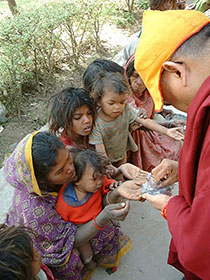- Home
- FPMT Homepage
Foundation for the Preservation of the Mahayana Tradition
The FPMT is an organization devoted to preserving and spreading Mahayana Buddhism worldwide by creating opportunities to listen, reflect, meditate, practice and actualize the unmistaken teachings of the Buddha and based on that experience spreading the Dharma to sentient beings. We provide integrated education through which people’s minds and hearts can be transformed into their highest potential for the benefit of others, inspired by an attitude of universal responsibility and service. We are committed to creating harmonious environments and helping all beings develop their full potential of infinite wisdom and compassion. Our organization is based on the Buddhist tradition of Lama Tsongkhapa of Tibet as taught to us by our founders Lama Thubten Yeshe and Lama Thubten Zopa Rinpoche.
- Willkommen
Die Stiftung zur Erhaltung der Mahayana Tradition (FPMT) ist eine Organisation, die sich weltweit für die Erhaltung und Verbreitung des Mahayana-Buddhismus einsetzt, indem sie Möglichkeiten schafft, den makellosen Lehren des Buddha zuzuhören, über sie zur reflektieren und zu meditieren und auf der Grundlage dieser Erfahrung das Dharma unter den Lebewesen zu verbreiten.
Wir bieten integrierte Schulungswege an, durch denen der Geist und das Herz der Menschen in ihr höchstes Potential verwandelt werden zum Wohl der anderen – inspiriert durch eine Haltung der universellen Verantwortung und dem Wunsch zu dienen. Wir haben uns verpflichtet, harmonische Umgebungen zu schaffen und allen Wesen zu helfen, ihr volles Potenzial unendlicher Weisheit und grenzenlosen Mitgefühls zu verwirklichen.
Unsere Organisation basiert auf der buddhistischen Tradition von Lama Tsongkhapa von Tibet, so wie sie uns von unseren Gründern Lama Thubten Yeshe und Lama Thubten Zopa Rinpoche gelehrt wird.
- Bienvenidos
La Fundación para la preservación de la tradición Mahayana (FPMT) es una organización que se dedica a preservar y difundir el budismo Mahayana en todo el mundo, creando oportunidades para escuchar, reflexionar, meditar, practicar y actualizar las enseñanzas inconfundibles de Buda y en base a esa experiencia difundir el Dharma a los seres.
Proporcionamos una educación integrada a través de la cual las mentes y los corazones de las personas se pueden transformar en su mayor potencial para el beneficio de los demás, inspirados por una actitud de responsabilidad y servicio universales. Estamos comprometidos a crear ambientes armoniosos y ayudar a todos los seres a desarrollar todo su potencial de infinita sabiduría y compasión.
Nuestra organización se basa en la tradición budista de Lama Tsongkhapa del Tíbet como nos lo enseñaron nuestros fundadores Lama Thubten Yeshe y Lama Zopa Rinpoche.
A continuación puede ver una lista de los centros y sus páginas web en su lengua preferida.
- Bienvenue
L’organisation de la FPMT a pour vocation la préservation et la diffusion du bouddhisme du mahayana dans le monde entier. Elle offre l’opportunité d’écouter, de réfléchir, de méditer, de pratiquer et de réaliser les enseignements excellents du Bouddha, pour ensuite transmettre le Dharma à tous les êtres. Nous proposons une formation intégrée grâce à laquelle le cœur et l’esprit de chacun peuvent accomplir leur potentiel le plus élevé pour le bien d’autrui, inspirés par le sens du service et une responsabilité universelle. Nous nous engageons à créer un environnement harmonieux et à aider tous les êtres à épanouir leur potentiel illimité de compassion et de sagesse. Notre organisation s’appuie sur la tradition guéloukpa de Lama Tsongkhapa du Tibet, telle qu’elle a été enseignée par nos fondateurs Lama Thoubtèn Yéshé et Lama Zopa Rinpoché.
Visitez le site de notre Editions Mahayana pour les traductions, conseils et nouvelles du Bureau international en français.
Voici une liste de centres et de leurs sites dans votre langue préférée
- Benvenuto
L’FPMT è un organizzazione il cui scopo è preservare e diffondere il Buddhismo Mahayana nel mondo, creando occasioni di ascolto, riflessione, meditazione e pratica dei perfetti insegnamenti del Buddha, al fine di attualizzare e diffondere il Dharma fra tutti gli esseri senzienti.
Offriamo un’educazione integrata, che può trasformare la mente e i cuori delle persone nel loro massimo potenziale, per il beneficio di tutti gli esseri, ispirati da un’attitudine di responsabilità universale e di servizio.
Il nostro obiettivo è quello di creare contesti armoniosi e aiutare tutti gli esseri a sviluppare in modo completo le proprie potenzialità di infinita saggezza e compassione.
La nostra organizzazione si basa sulla tradizione buddhista di Lama Tsongkhapa del Tibet, così come ci è stata insegnata dai nostri fondatori Lama Thubten Yeshe e Lama Zopa Rinpoche.
Di seguito potete trovare un elenco dei centri e dei loro siti nella lingua da voi prescelta.
- 欢迎 / 歡迎
简体中文
“护持大乘法脉基金会”( 英文简称:FPMT。全名:Foundation for the Preservation of the Mahayana Tradition) 是一个致力于护持和弘扬大乘佛法的国际佛教组织。我们提供听闻,思维,禅修,修行和实证佛陀无误教法的机会,以便让一切众生都能够享受佛法的指引和滋润。
我们全力创造和谐融洽的环境, 为人们提供解行并重的完整佛法教育,以便启发内在的环宇悲心及责任心,并开发内心所蕴藏的巨大潜能 — 无限的智慧与悲心 — 以便利益和服务一切有情。
FPMT的创办人是图腾耶喜喇嘛和喇嘛梭巴仁波切。我们所修习的是由两位上师所教导的,西藏喀巴大师的佛法传承。
繁體中文
護持大乘法脈基金會”( 英文簡稱:FPMT。全名:Found
ation for the Preservation of the Mahayana Tradition ) 是一個致力於護持和弘揚大乘佛法的國際佛教組織。我們提供聽聞, 思維,禪修,修行和實證佛陀無誤教法的機會,以便讓一切眾生都能 夠享受佛法的指引和滋潤。 我們全力創造和諧融洽的環境,
為人們提供解行並重的完整佛法教育,以便啟發內在的環宇悲心及責 任心,並開發內心所蘊藏的巨大潛能 — 無限的智慧與悲心 – – 以便利益和服務一切有情。 FPMT的創辦人是圖騰耶喜喇嘛和喇嘛梭巴仁波切。
我們所修習的是由兩位上師所教導的,西藏喀巴大師的佛法傳承。 察看道场信息:
- FPMT Homepage
- News/Media
-
- Study & Practice
-
-
- About FPMT Education Services
- Latest News
- Programs
- New to Buddhism?
- Buddhist Mind Science: Activating Your Potential
- Heart Advice for Death and Dying
- Discovering Buddhism
- Living in the Path
- Exploring Buddhism
- FPMT Basic Program
- FPMT Masters Program
- FPMT In-Depth Meditation Training
- Maitripa College
- Lotsawa Rinchen Zangpo Translator Program
- Universal Education for Compassion & Wisdom
- Online Learning Center
-
- Prayers & Practice Materials
- Overview of Prayers & Practices
- Full Catalogue of Prayers & Practice Materials
- Explore Popular Topics
- Benefiting Animals
- Chenrezig Resources
- Death & Dying Resources
- Lama Chopa (Guru Puja)
- Lama Zopa Rinpoche: Compendium of Precious Instructions
- Lama Zopa Rinpoche: Life Practice Advice
- Lama Zopa Rinpoche Practice Series
- Lamrim Resources
- Mantras
- Prayer Book Updates
- Purification Practices
- Sutras
- Thought Transformation (Lojong)
- Audio Materials
- Dharma Dates - Tibetan Calendar
- Translation Services
- Publishing Services
- Ways to Offer Support
- Prayers & Practice Materials
-
- Teachings and Advice
- Find Teachings and Advice
- Lama Zopa Rinpoche Advice Page
- Lama Zopa Rinpoche: Compendium of Precious Instructions
- Lama Zopa Rinpoche Video Teachings
- ༧སྐྱབས་རྗེ་བཟོད་པ་རིན་པོ་ཆེ་མཆོག་ནས་སྩལ་བའི་བཀའ་སློབ་བརྙན་འཕྲིན།
- Podcasts
- Lama Yeshe Wisdom Archive
- Buddhism FAQ
- Dharma for Young People
- Resources on Holy Objects
- Teachings and Advice
-
-
*If a menu item has a submenu clicking once will expand the menu clicking twice will open the page.
-
-
- Centers
-
- Teachers
-
- Projects
-
-
-
-
*If a menu item has a submenu clicking once will expand the menu clicking twice will open the page.
-
-
- FPMT
-
-
-
-
-
When others insult, rebuke and speak unpleasant words to us, although an intolerable pain arises like a thorn at the heart, if we comprehend the teachings then we can recognize the essenceless nature of these words which resemble an echo. So just as when an inanimate object is scolded, we will experience not the slightest mental turmoil.
His Holiness the Dalai Lama
-
-
-
- Shop
-
-
-
The Foundation Store is FPMT’s online shop and features a vast selection of Buddhist study and practice materials written or recommended by our lineage gurus. These items include homestudy programs, prayers and practices in PDF or eBook format, materials for children, and other resources to support practitioners.
Items displayed in the shop are made available for Dharma practice and educational purposes, and never for the purpose of profiting from their sale. Please read FPMT Foundation Store Policy Regarding Dharma Items for more information.
-
-
Lama Zopa Rinpoche News and Advice
31
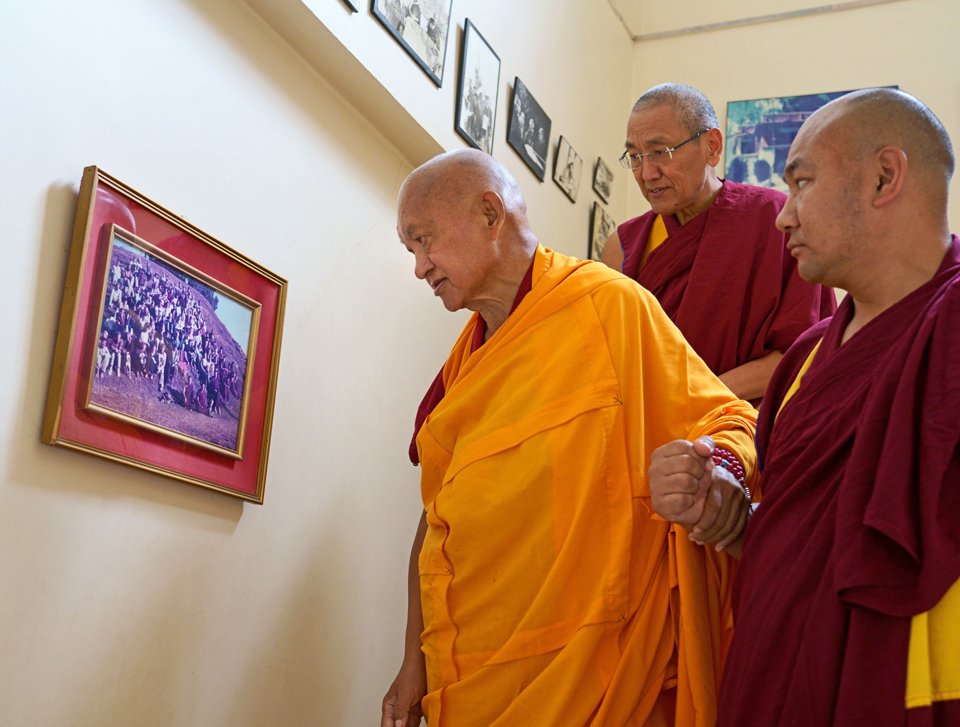
Lama Zopa Rinpoche pausing to look at a group photo from an early Kopan Course with Khen Rinpoche Geshe Chonyi and Ven. Thubten Tendar, Kopan Monastery, Nepal, August 2020. Photo by Ven. Lobsang Sherab.
Lama Zopa Rinpoche continues his video teachings on thought transformation from Kopan Monastery in Nepal. Here is a summary of the most recent teaching:
This video begins with the precious opportunity for us to hear from Max Mathews, known affectionately as “Mummy Max,” who met Lama Yeshe and Lama Zopa Rinpoche in 1968 and was instrumental in establishing and funding Kopan Monastery in the 1970s. We invite you to take a moment to get to know this remarkable person and listen to her talk about this formative time in FPMT history.
Lama Zopa Rinpoche begins his teaching explaining that without the body and mind, there is no “I.” Believing that there is a real “I” without depending on the continuity of consciousness and body is totally mistaken. The real “I” is not there. If you look for it scientifically or through meditation, you can’t find it. This is the most important subject for Western science to check and to realize because all suffering comes from the ignorance that believes in a real “I.”
Rinpoche then turns the teaching toward a discussion of bodhichitta, the wish to attain enlightenment in order to end the suffering of all sentient beings. In your bodhichitta motivation, not one sentient being in numberless universes is left out. That means everyone, not just nice sentient beings!
Rinpoche then discusses the actions of the buddhas and the guru. The buddhas are manifesting as the guru, doing actions for every single sentient being in numberless universes. Because your mind is so obscured, you cannot see any buddha in the aspect of a buddha. We are so fortunate to be able to see the guru in human form, rather than as a donkey or mouse! This is the kindness of the guru, appearing in ordinary aspect for your benefit.
Keep in mind, whatever the guru does, this is the action of all the buddhas. Without a guru, you cannot be liberated from samsara, and your mind cannot receive the actions of the buddhas, the guidance of the buddhas. It is the most important relationship you have. The guru is more special than even Vajradhara because you learn the qualities you need to achieve enlightenment in this life.
Rinpoche then offers a small teaching on prostrations (starting at 1:19:48 in the video), including the meaning of the prostration mudra, how to do prostrations and the significance of touching different parts of the body, what to think when you touch the different parts of the body, how to do a proper full length prostration, an explanation of why you should do short five-limb prostrations when taking pratimoksha vows, and what to meditate on as you are lying down during prostration.
Rinpoche then gives the lung of The Array of Sukhavati Pure Land. (The section on the lung begins at 1:33:18 in the video).
We invite you to go deeper into the topics presented here, plus many others, by watching Rinpoche’s video and reading the full transcript of Rinpoche’s teaching.
Watch Lama Zopa Rinpoche’s teaching “All the Buddhas Manifest as the Guru in Ordinary Aspect to Guide You”:
https://youtu.be/CDxzLWejlSI
- Read the transcript of Rinpoche’s teaching
- The Array of Sukhavati Pure Land: A Concise Mahayana Sutra
- Many of the stories Max Mathews refers to can be read in Big Love: The Life and Teachings of Lama Yeshe.
- Dedication verses for COVID-19 Crisis Teachings
Watch more from the video series Lama Zopa Rinpoche’s Teachings on Thought Transformation during the Time of COVID-19 and find links to videos in translation, transcripts, MP3s, additional practice advice, and more:
https://fpmt.org/fpmt/announcements/resources-for-coronavirus-pandemic/advice-from-lama-zopa-rinpoche-for-coronavirus/
Practice advice from our teachers, Dharma study-from-home opportunities, and more can be found on the page “Resources for the Coronavirus Pandemic.”
Lama Zopa Rinpoche is the spiritual director of the Foundation for the Preservation of Mahayana Tradition (FPMT), a Tibetan Buddhist organization dedicated to the transmission of the Mahayana Buddhist tradition and values worldwide through teaching, meditation and community service.
- Tagged: advice from lama zopa rinpoche, array of sukhavati pure land, coronavirus, covid-19, fpmt history, guru devotion, lama zopa rinpoche thought transformation video teaching, oral transmission, ven max mathews, video
26
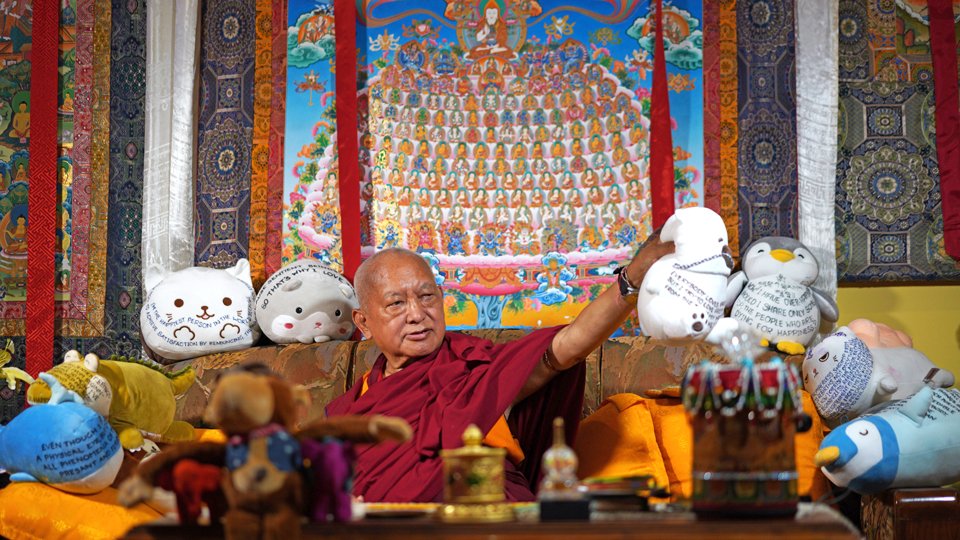
Lama Zopa Rinpoche showing a stuffed toy upon which he had Dharma messages written, Kopan Monastery, August 2020. Photo by Ven. Lobsang Sherab.
Lama Zopa Rinpoche continues his video teachings on thought transformation from Kopan Monastery in Nepal. Here is a summary of the most recent teaching:
Rinpoche begins this teaching referring to his earlier teachings on the importance of receiving blessings from the guru, which he discussed in the previous two video teachings.
Rinpoche then initiates a discussion of karma, listing the four results of negative karma, which describe the ways karma will ripen in this life or in future lives:
- The ripened-aspect result is the karmic result that happens even if you are ignorant of the karma you created.
- The possessed result is the result that happens in the environment around you based on your past actions. For example as a result of killing, you are born into a land where there are wars, fighting, disease, and so forth.
- Experiencing the result similar to the cause is when you experience what you have done to others in the past. For example, if you killed someone, in the future you will be killed by someone.
- Creating the result similar to the cause is when you continue to do something or have a habit to do something because of past actions. For example if you killed in the past, you will continue to kill in the present and future. This happens until the negative karma is confessed and purified.
It is very easy to create the negative karma of killing, particularly with tiny insects. For example, it is important to check the sink for insects before you turn water on. You also need to have this awareness when you want to slap at your body because of an insect crawling on your skin. In general it is important to have an awareness of small creatures so you don’t harm them. Because it is so easy to create this kind of negative karma, we must apply the remedy with the four opponent powers and purification practices such as Vajrasattva practice, prostrations to the Thirty-five Confession Buddhas, and so forth. Without doing this, negative karma will have to be experienced in many lifetimes.
The guru manifests in whatever way is necessary to subdue sentient beings. In fact, wherever you are, there are numberless buddhas there in various forms. You never think that the animals you see could be buddhas manifesting to benefit you. In fact, buddhas manifest in all kinds of aspects to guide you, but they do mainly manifest as the guru which, is actually, numberless buddhas.
When the guru is praising you, all the buddhas are praising you; when the guru scolds you, all the buddhas are scolding you. When you see actions of your guru as mistakes such as attachment, ignorance, immoral behavior, and so forth, you have to remember that a buddha never makes mistakes. Rather, the guru is showing you the aspect of mistakes because your mind is so obscured and defiled that the only way for the guru to guide you is in an ordinary aspect. If the guru didn’t show themselves in ordinary aspect, you wouldn’t be able to receive vows, teachings, and so forth. In this way, the guru showing an ordinary aspect is kinder than all the buddhas and is like the limitless sky.
Rinpoche then talks about the benefit of prostration, which is the remedy to pride and a very good method to humble yourself and show respect. Further, you should respect sentient beings in the same way that you respect buddhas, if not for their sake, then for the sake of yourself. When you harm others you experience the result of torment in the lower realms, which could last for eons! This is not just from harming human beings, but also when, for own pleasure, you kill and eat animals. When you use others for your own happiness, you will experience the result such as being used by others in the future. However, if you cherish others with a bodhichitta motivation and think of only their happiness, you create the cause for happiness and you become a leader in this life or the next life for your country or the world; you lead others in Dharma, you lead them to happiness, to enlightenment.
We invite you to go deeper into the topics presented here, plus many others, by watching Rinpoche’s video and reading the full transcript of Rinpoche’s teaching.
Watch Lama Zopa Rinpoche’s teaching “With Awareness of the Kindness of the Guru, You Generate Respect”:
https://youtu.be/NX3sc-ImndU
- Read the transcript of Rinpoche’s teaching
- Find more teachings on karma on the Lama Yeshe Wisdom Archive
- Dedication verses for COVID-19 Crisis Teachings
Watch more from the video series Lama Zopa Rinpoche’s Teachings on Thought Transformation during the Time of COVID-19 and find links to videos in translation, transcripts, MP3s, additional practice advice, and more:
https://fpmt.org/fpmt/announcements/resources-for-coronavirus-pandemic/advice-from-lama-zopa-rinpoche-for-coronavirus/
Practice advice from our teachers, Dharma study-from-home opportunities, and more can be found on the page “Resources for the Coronavirus Pandemic.”
Lama Zopa Rinpoche is the spiritual director of the Foundation for the Preservation of Mahayana Tradition (FPMT), a Tibetan Buddhist organization dedicated to the transmission of the Mahayana Buddhist tradition and values worldwide through teaching, meditation and community service.
- Tagged: advice from lama zopa rinpoche, coronavirus, covid-19, guru devotion, karma, lama zopa rinpoche thought transformation video teaching, video
24
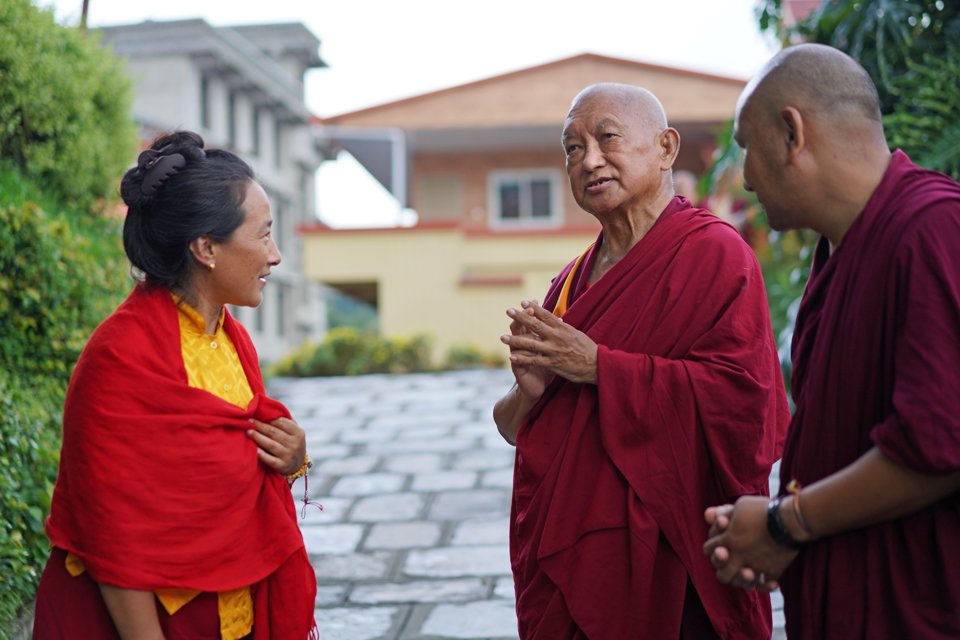
Khadro-la and Lama Zopa Rinpoche at Kopan Monastery, Nepal, August 2020. Photo by Ven. Lobsang Sherab.
Lama Zopa Rinpoche continues his video teachings on thought transformation from Kopan Monastery in Nepal. Here is a summary of the most recent teaching:
Rinpoche begins this teaching explaining that to see an enlightened being, it has to come from your own side. When the mind is obscured, you cannot see enlightened beings. We have to practice from our side, not from the object’s side.
You are responsible for your mind. How much evil you experience, how much samsaric suffering you experience, and whether you become enlightened, all this comes from your mind. Every day, every hour, every minute, every second, it is your responsibility to take care of your mind. It is up to you whether you want to be enlightened or continue to suffer.
At the beginning you mistakenly think, I’m perfect, so all my problems have to come from outside of me. But remember that all great holy beings bore tremendous hardships to practice Dharma and actualize the path. Like that, you have to make your mind see the positive so you can bear hardships with a pure view. It is up to you whether you study or not, whether you want to be liberated from samsara or stay in samsara forever.
Rinpoche then discusses the eight benefits of putting your hands together in prostration mudra to your guru or a holy object:
- You will receive a perfect body in the next life.
- You will have perfect people surrounding you, helping your wishes succeed.
- You will have perfect morality that becomes the basis of realization.
- You will have devotion to your guru so it is easy to follow the guru’s wishes.
- You will have courage—a brave mind leading many sentient beings to enlightenment.
- Your will receive rebirth as a deva or a human being.
- You will achieve the arya path, the transcendental exalted path. Then, having wisdom directly perceiving emptiness you won’t get reborn in the lower realms.
- You will achieve enlightenment.
Rinpoche also discusses the ten benefits of putting your hands together in prostration mudra to a holy object:
- You will be born in a high caste, due to which people will listen to and respect you.
- You will have a beautiful body.
- You will have many servants and other people around you who help you.
- You will have much wealth.
- Your parents will respect and serve you.
- You will have extensive listening to Dharma.
- You will have much devotion.
- You will have great wisdom.
- You will receive a higher rebirth.
- You will actualize the great path to nirvana and the great path to full enlightenment.
When you see a holy object you should think, All of these holy objects are my root guru who manifested this to liberate me from the lower realms. You should think of the kindness manifesting in every single holy object. Prostrate whenever you see any holy object because it causes you to achieve Buddha’s holy body, speech, mind, and all qualities. Whenever you are in a place with many holy objects, put your hands together while turning your body toward the holy objects and think, I prostrate to all the gurus.
When you see the guru, you see the Buddha. And not just one, all the buddhas. Whatever the guru does is the action of numberless buddhas—every atom of the guru is numberless buddhas who manifest in different forms to benefit sentient beings depending on the mind of the being.
We invite you to go deeper into the topics presented here, plus many others, by watching Rinpoche’s video and reading the full transcript of Rinpoche’s teaching.
Watch Lama Zopa Rinpoche’s teaching “The Work of Seeing the Guru as a Buddha Has to Come from Your Side”:
https://youtu.be/-8S-MGLf988
Watch more from the video series Lama Zopa Rinpoche’s Teachings on Thought Transformation during the Time of COVID-19 and find links to videos in translation, transcripts, MP3s, additional practice advice, and more:
https://fpmt.org/fpmt/announcements/resources-for-coronavirus-pandemic/advice-from-lama-zopa-rinpoche-for-coronavirus/
Practice advice from our teachers, Dharma study-from-home opportunities, and more can be found on the page “Resources for the Coronavirus Pandemic.”
Lama Zopa Rinpoche is the spiritual director of the Foundation for the Preservation of Mahayana Tradition (FPMT), a Tibetan Buddhist organization dedicated to the transmission of the Mahayana Buddhist tradition and values worldwide through teaching, meditation and community service.
- Tagged: advice from lama zopa rinpoche, coronavirus, covid-19, guru devotion, holy objects, lama zopa rinpoche thought transformation video teaching, prostration mudra, video
20
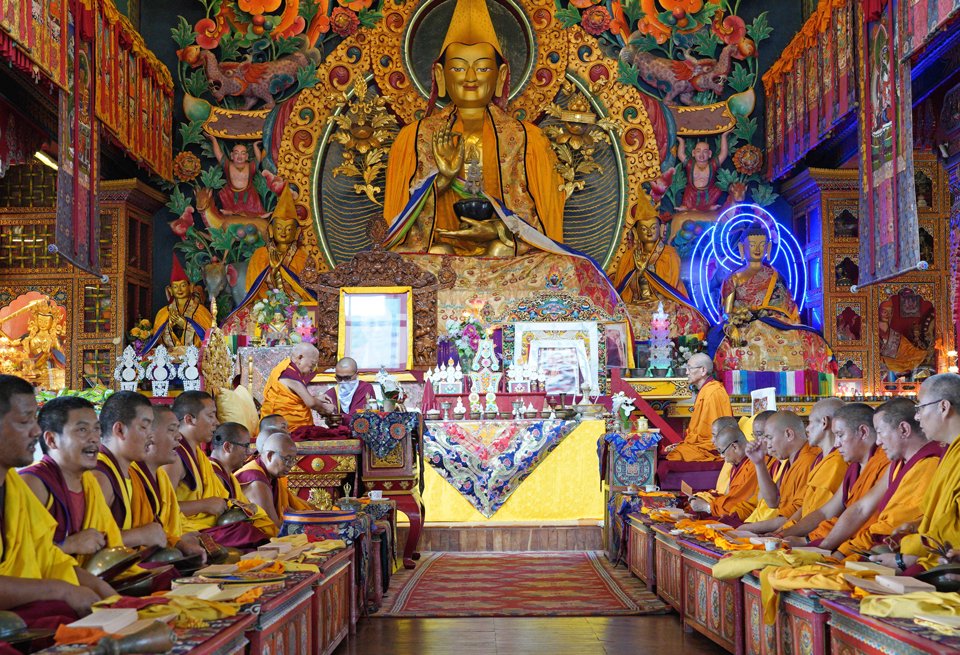
Lama Zopa Rinpoche, Khen Rinpoche Geshe Chonyi, and Kopan monks offering Most Secret Hayagriva tsog kong puja; this puja was one of a few that was advised by Khadro-la for Rinpoche’s health and long life, Kopan Monastery, Nepal, August 2020. Photo by Ven. Lobsang Sherab.
Lama Zopa Rinpoche continues his video teachings on thought transformation from Kopan Monastery in Nepal. Here is a summary of the most recent teaching:
Rinpoche begins this teaching explaining why it is important to take blessings from holy beings. Holy beings are free from suffering and the causes of suffering, and have generated bodhichitta and have clear light realizations. For someone with those qualities, when they touch a sentient being, it purifies the negative karma for that sentient being and anyone who is around them. Rinpoche explains that there are eight benefits (which he will explain in a later teaching) of receiving a blessing from a holy being. Rinpoche shows how to put ones hands together to receive a blessing, with palms together and thumbs tucked in, like offering a jewel.
If you follow desire, you cannot find happiness or satisfaction. If you control your mind and practice Dharma, you make your mind content and satisfied, and then you can find happiness. The poor think the rich are happy, and the rich think the poor are happy, but both are suffering. The way to generate renunciation is to renounce pervasive compounding suffering, which is the nature of suffering with the aggregates being totally under the control of delusion and karma. With this suffering, there’s no freedom at all, not even a second free from beginningless rebirths. Every moment is contaminated with the seed of delusion and karma. Then it again happens—from the seed, delusion arises, then suffering arises. Again and again. From that, the suffering of pain and suffering of change arise.
The suffering of being in samsara is like being in a prison, or like being in a fire that you become one with. We don’t recognize it; instead we try to enjoy the big hallucination. Those who have renunciation see that they are sitting on a thorn bush. Only when there are problems do you want to try something else. And until you meet Dharma, you don’t know what else to try. Whatever you do is suffering. Whether you live alone, whether you live in the mountains—wherever you live there is suffering. Whatever you enjoy, it is suffering.
The most important thing in life is to free others from all the suffering in each realm. Bodhichitta is not just expressing some nice words. It is wanting to free all beings from all the suffering. Bodhichitta is the most necessary thing for your happiness and for the happiness of every single sentient being. Not one single sentient being in any realm in numberless universes is left out from this, including your enemies, including the mosquitoes! It is so important to generate the thought to achieve enlightenment for them, to benefit them. There is nothing better. It is the happiest life—not drinking alcohol and doing drugs, or climbing Mount Everest, where an avalanche can happen, or you get lost. What more than the happiness of benefiting others can you look for? Where? This you can do wherever you are.
We invite you to go deeper into the topics presented here, plus many others, by watching Rinpoche’s video and reading the full transcript of Rinpoche’s teaching.
Watch Lama Zopa Rinpoche’s teaching “Why and How to Take Blessings from a Holy Being“:
https://youtu.be/2cPuNH3QGHk
Watch more from the video series Lama Zopa Rinpoche’s Teachings on Thought Transformation during the Time of COVID-19 and find links to videos in translation, transcripts, MP3s, additional practice advice, and more:
https://fpmt.org/fpmt/announcements/resources-for-coronavirus-pandemic/advice-from-lama-zopa-rinpoche-for-coronavirus/
Practice advice from our teachers, Dharma study-from-home opportunities, and more can be found on the page “Resources for the Coronavirus Pandemic.”
Lama Zopa Rinpoche is the spiritual director of the Foundation for the Preservation of Mahayana Tradition (FPMT), a Tibetan Buddhist organization dedicated to the transmission of the Mahayana Buddhist tradition and values worldwide through teaching, meditation and community service.
- Tagged: advice from lama zopa rinpoche, coronavirus, covid-19, lama zopa rinpoche thought transformation video teaching, video
19
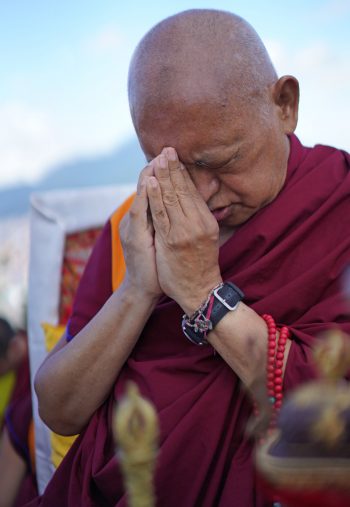
Lama Zopa Rinpoche during incense puja on top of hill at Kopan Monastery, Nepal, August 2020. Photo by Ven. Lobsang Sherab.
Lama Zopa Rinpoche continues his video teachings on thought transformation from Kopan Monastery in Nepal. Here is a summary of the most recent teaching:
Rinpoche begins this teaching reminding us that remembering death and impermanence encourages us to practice right now. This is not just about having fear about dying, but encouraging you to practice Dharma now, not when you get old. Thinking that way assumes that you will not die young, and there is no promise of this. So many people who thought they would live for many years end up dying today.
At the time of death nothing can benefit you other than Dharma. The people surrounding you at the time of death can’t be brought with you, nor your possessions—not even your body that you cherish most. You can’t carry one atom of this life with you. Only holy Dharma can benefit you at the time of death, nothing else.
The conclusion is to practice holy Dharma whatever you are doing: eating, using the toilet, drinking, walking, sitting, sleeping—everything has to become holy Dharma, not worldly dharma.
By meditating on death and impermanence, you know how to subdue your mind. You won’t see any purpose for getting angry. You can die at any time, so why create additional negative karma?
Since beginningless rebirths you have been harming, killing, and suffering. If you meditate on impermanence, you don’t see any purpose for desire or attachment. You realize your mind cheated you by following attachment and by using everything, including your body, merits, possessions, and the people in your life, the wrong way with the wrong concept. So subdue your mind by meditating on death and impermanence.
If you believe that you won’t die, no matter how much Dharma you know, your life is no different than that of an animal. Even if you have a hundred qualities, if you believe this life is permanent, you are no different than an insect or a tiger. Somebody harms them, they harm back. If you don’t think of death and impermanence, all of your hard work becomes for this life’s happiness only, nothing you do becomes holy Dharma. However, by remembering death and impermanence, whatever you do becomes holy Dharma. If you mix activities of this life and holy Dharma, you will lose holy Dharma due to focusing on the happiness of this life. All mistakes happen due to not having the thought of death and impermanence.
Rinpoche then offers the oral transmission of Phabongkha Rinpoche’s The Heart’s Utmost Need and offers some commentary on this poignant meditation, which discusses the reality that death will arrive for every single one of us.
We invite you to go deeper into the topics presented here, plus many others, by watching Rinpoche’s video and reading the full transcript of Rinpoche’s teaching.
Watch Lama Zopa Rinpoche’s teaching “The One Mistake Is Not Remembering Impermanence Death”:
https://youtu.be/YO6e5K-GZ2U
- Read the transcript of Rinpoche’s teaching
- The Heart’s Utmost Need: Persuading Oneself and Others to Remember Impermanenc and Death by Phabongkha Rinpoche
- Rinpoche discusses the difference between worldly dharma and holy Dharma in the transcript of the teaching “Transforming the Mind into Guru Devotion and Renouncing the Eight Worldly Dharmas.”
- Dedication verses for COVID-19 Crisis Teachings
Watch more from the video series Lama Zopa Rinpoche’s Teachings on Thought Transformation during the Time of COVID-19 and find links to videos in translation, transcripts, MP3s, additional practice advice, and more:
https://fpmt.org/fpmt/announcements/resources-for-coronavirus-pandemic/advice-from-lama-zopa-rinpoche-for-coronavirus/
Practice advice from our teachers, Dharma study-from-home opportunities, and more can be found on the page “Resources for the Coronavirus Pandemic.”
Lama Zopa Rinpoche is the spiritual director of the Foundation for the Preservation of Mahayana Tradition (FPMT), a Tibetan Buddhist organization dedicated to the transmission of the Mahayana Buddhist tradition and values worldwide through teaching, meditation and community service.
- Tagged: advice from lama zopa rinpoche, coronavirus, covid-19, death and dying, heart spoon, impermanence and death, lama zopa rinpoche thought transformation video teaching, oral transmission, video
18
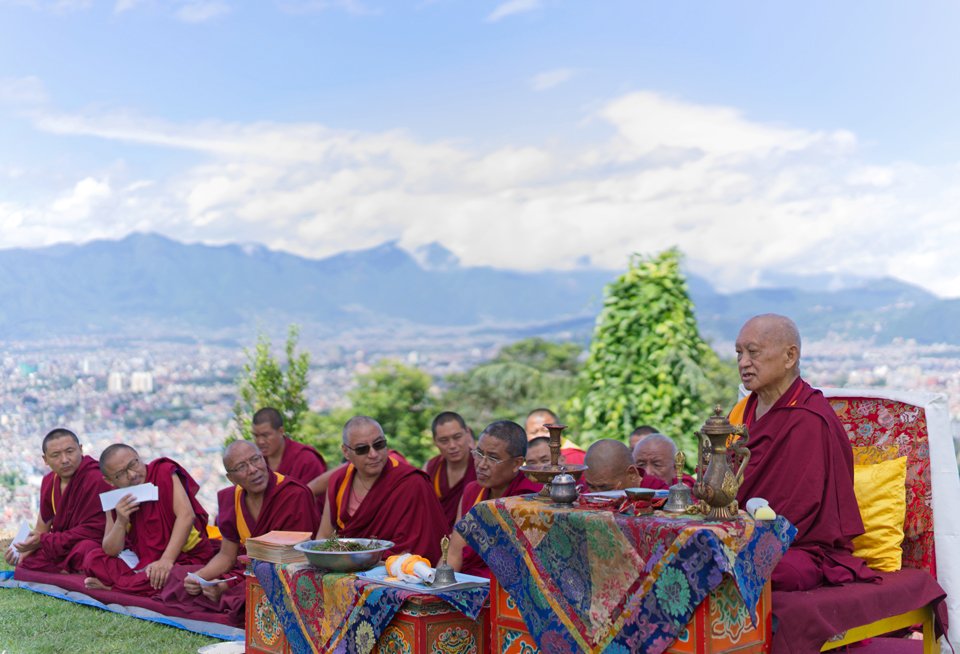
Lama Zopa Rinpoche and monks offer incense puja on top of hill at Kopan Monastery, Nepal, August 2020. Photo by Ven. Lobsang Sherab.
Lama Zopa Rinpoche continues his video teachings on thought transformation from Kopan Monastery in Nepal. Here is a summary of the most recent teaching:
Rinpoche begins this teaching explaining, You can’t lead sentient beings to enlightenment with an ignorant mind. Even Arhats cannot do perfect work for sentient beings because they have not abandoned the four causes of unknowing which are unknowing due to the subtlety of karma, unknowing due to the remoteness of time, unknowing due to the profound and subtle qualities of the buddhas, and unknowing due to the remoteness of the place. Rinpoche discusses each of these causes in detail.
The reason to meditate and practice Dharma is to subdue your mind so you can do perfect work for others without the slightest mistake. What you must subdue and cease is the anger, attachment, self-cherishing thought, and ignorance. Meditating on impermanence and death is like the king to control and subdue the mind.
By having the ten innermost jewels of the Kadampas in your heart, this destroys all the hallucination of this world and dries up the oceans of attachment. The fortress of delusions collapses. You become a happy person when you renounce worldly concern and live in the ten innermost jewels. Happiness starts when you avert thoughts of desire for this life.
If you act according to holy Dharma, you can benefit yourself and others. If you practice holy Dharma well, even in this life you will be happier than others who work only for this life and whose main practice is to achieve desire in this life. If you desire happiness, then give up worldly desire.
We invite you to go deeper into the topics presented here, plus many others, by watching Rinpoche’s video and reading the full transcript of Rinpoche’s teaching.
Watch Lama Zopa Rinpoche’s teaching “ Living in the Ten Innermost Jewels is the Method to Achieve Happiness“:
https://youtu.be/gymxwIYZ3G8
- Read the transcript of Rinpoche’s teaching
- Ten Innermost Jewels of the Kadampas
- Dedication verses for COVID-19 Crisis Teachings
Watch more from the video series Lama Zopa Rinpoche’s Teachings on Thought Transformation during the Time of COVID-19 and find links to videos in translation, transcripts, MP3s, additional practice advice, and more:
https://fpmt.org/fpmt/announcements/resources-for-coronavirus-pandemic/advice-from-lama-zopa-rinpoche-for-coronavirus/
Practice advice from our teachers, Dharma study-from-home opportunities, and more can be found on the page “Resources for the Coronavirus Pandemic.”
Lama Zopa Rinpoche is the spiritual director of the Foundation for the Preservation of Mahayana Tradition (FPMT), a Tibetan Buddhist organization dedicated to the transmission of the Mahayana Buddhist tradition and values worldwide through teaching, meditation and community service.
- Tagged: advice from lama zopa rinpoche, coronavirus, covid-19, impermanence and death, lama zopa rinpoche thought transformation video teaching, ten innermost jewels of the kadampas, video
14
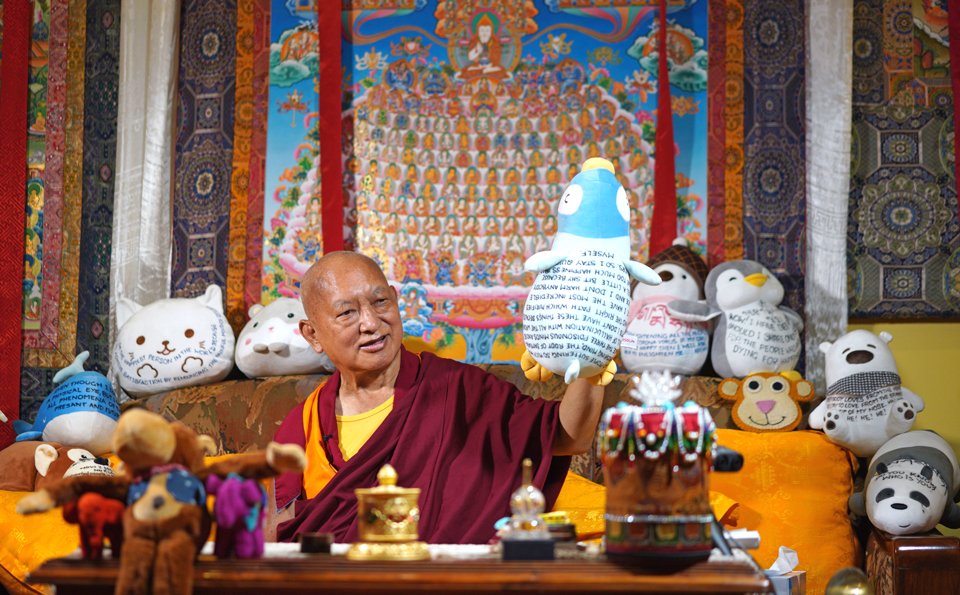
Lama Zopa Rinpoche explaining the Dharma messages he has written on stuffed toys, Kopan Monastery, Nepal, August 2020. Photo by Ven. Lobsang Sherab.
Lama Zopa Rinpoche continues his video teachings on thought transformation from Kopan Monastery in Nepal. Here is a summary of the most recent teaching:
Rinpoche begins this teaching asking: As long as you are not free from samsara, how can you be well when you have the three types of suffering? To subdue the mind, you must remember impermanence and death.
Rinpoche mentions the six shortcomings of not remembering death from Phabongkha Rinpoche’s Liberation in the Palm of Your Hand:
- Not remembering Dharma;
- Even though you remember Dharma, you don’t practice it;
- Even though you practice Dharma, you are not able to practice it purely;
- Even if you practice Dharma purely, you will not do it precisely and continuously;
- You make yourself evil (meaning: you engage in negative karma); and
- At the time of death, you will die with much upsetness (worry).
Right now you think Dharma is good, but you don’t practice it because you think, Later, after some time I will do this. Then suddenly death comes and life is gone. There is no more time to practice, and the mind becomes so upset. The shortcomings of negative karma, the lower realms’ suffering, is unbelievable. Even a great suffering in the human realm cannot be compared to a small suffering in hell. Unless negative karma finishes, you will never be separated from unbearable suffering.
Rinpoche mentions the benefits of remembering death:
- It is highly meaningful;
- It is very powerful in order to overcome the delusions;
- It makes you follow Dharma;
- It persuades you to put effort into Dharma;
- It makes you actualize Dharma; and
- When you die, you die with great happiness.
The best Dharma practitioners die happy, the middling die without sadness, and the least die without regret.
It is very effective for the mind to meditate on the aspects of death.
When you die, the appearances of this life are like last night’s dream. Even though you believed that the dream was real life, when you look back at the time of death you can see it is totally false. So it is not worth being attached to, grasping at, or angry at—nothing to hate, nothing to destroy, nothing is real.
Desire enjoyments are like an illusion party. It is like a mirage, an hallucination to believe this is happiness. Meaningless activities are like ripples on water. There is no happiness to enjoy in future life from doing activities for the pleasure of this life alone. And while you are distracted by worldly concern, death will come. Since you have to leave everything behind, don’t be attached to things of this life. Everything that belongs to you is left behind at the time of death. By training your mind in death and impermanence, you avert your attraction to the appearances of this life. When you no longer believe in the attraction to the perfections of this life, you have generated renunciation of samsara.
Meditation of death and impermanence is the root of all qualities. Among all the recognitions, recognition of death and impermanence is the best. Remembering death stops the delusions from arising and stops you from engaging in negative karma. The mind is subdued by meditating on death and impermanence.
We invite you to go deeper into the topics presented here, plus many others, by watching Rinpoche’s video and reading the full transcript of Rinpoche’s teaching.
Watch Lama Zopa Rinpoche’s teaching “Subdue Your Mind by Meditating on Death-Impermanence”:
https://youtu.be/VYM5NxJACqA
- Read the transcript of Rinpoche’s teaching
- Liberation in the Palm of Your Hand by Phabongka Dechen Nyingpo
- Dedication verses for COVID-19 Crisis Teachings
Watch more from the video series Lama Zopa Rinpoche’s Teachings on Thought Transformation during the Time of COVID-19 and find links to videos in translation, transcripts, MP3s, additional practice advice, and more:
https://fpmt.org/fpmt/announcements/resources-for-coronavirus-pandemic/advice-from-lama-zopa-rinpoche-for-coronavirus/
Practice advice from our teachers, Dharma study-from-home opportunities, and more can be found on the page “Resources for the Coronavirus Pandemic.”
Lama Zopa Rinpoche is the spiritual director of the Foundation for the Preservation of Mahayana Tradition (FPMT), a Tibetan Buddhist organization dedicated to the transmission of the Mahayana Buddhist tradition and values worldwide through teaching, meditation and community service.
- Tagged: advice from lama zopa rinpoche, coronavirus, covid-19, death and dying, impermanence and death, lama zopa rinpoche thought transformation video teaching, video
12
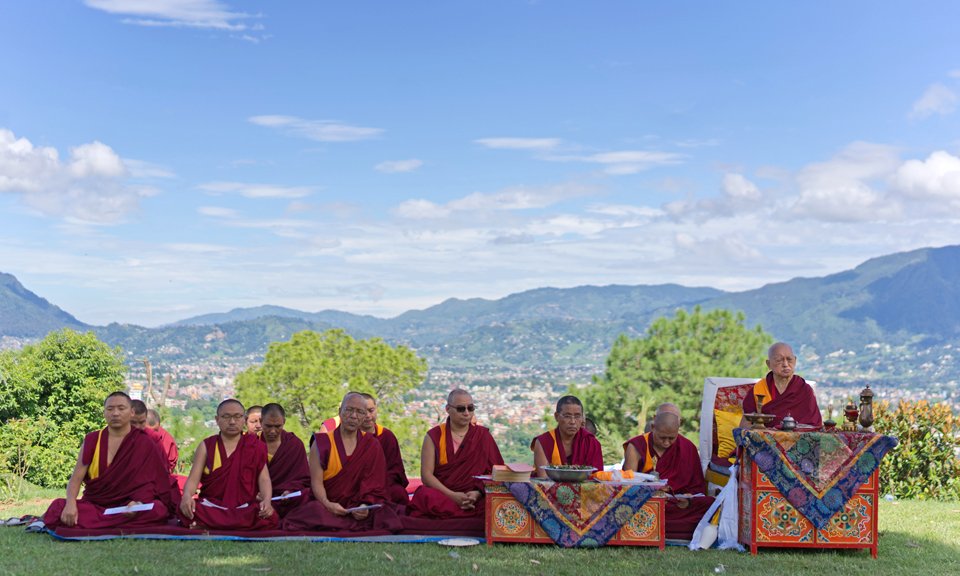
Lama Zopa Rinpoche and monks offer incense puja on top of hill at Kopan Monastery, Nepal, August 2020. Photo by Ven. Lobsang Sherab.
Lama Zopa Rinpoche continues his video teachings on thought transformation from Kopan Monastery in Nepal. Here is a summary of the most recent teaching:
Lama Zopa Rinpoche begins this teaching explaining that we are extremely fortunate to be alive today. Rinpoche shares the news that a young Tibetan nun from Kopan Nunnery, Ani Dechen, died. Rinpoche invites everyone to recite King of Prayers and do Chenrezig practice.
Rinpoche shares several stories of individuals recalling their past lives, including Rinpoche’s own experiences.
The real meaning of life is to benefit sentient beings. It is not enough to achieve the blissful state of peace, liberation from samsara, for oneself, but to free everyone from the oceans of samsaric sufferings and bring them to enlightenment by oneself alone.
One is so lucky to even be able to think about bodhichitta. Even if you don’t have a realization of bodhichitta, to even be able to think of and recite the words is unbelievable.
If you work for an FPMT center, you are practicing guru yoga. If you are a director, you should expect that people will criticize you. If you expect it from the beginning, then it doesn’t become a shock for you. Receiving a billion dollars a day is nothing compared to the benefits of serving the guru. You have to study the subject of guru devotion and relate it to working at a center. Then, you can see that working for a center makes your life most meaningful, not only for yourself but for numberless sentient beings.
For ordinary beings, the meditation on death and impermanence is the most important. By remembering impermanence and death, you conquer laziness and whatever you do becomes holy Dharma. The reality is: by tomorrow your body could become a corpse. You cannot just live a comfortable life thinking, “I won’t die today.” When you think of death and impermanence, there is no choice but to practice Dharma.
Phabongkha Rinpoche explains in Liberation in the Palm of Your Hand: By remembering death, at first, it makes you follow Dharma. In the middle, it persuades your mind in Dharma. At the end, it makes you actualize Dharma, that is, achieve enlightenment.
One must meditate on the aspects of death. For example, meditate on death by visualizing your own death according to the customs of the country in which you live. You must think that death is definite. There are three reasons why death is definite:
- The Lord or Death will definitely come and no condition can stop it.
- Nothing can be added to your life, and it is continuously decreasing.
- Even while you are alive, there is no time to practice Dharma (because your motivation is your attachment to the happiness of this life).
Rinpoche then leads practices for the Kopan nun who died. He advises, “Everybody should pray for her. The Kopan nuns and monks, everybody, should pray for her, and, of course, if possible all FPMT Sangha and lay [people].” King of Prayers and Chenrezig Mantra and Request are then recited. (For links to materials, please see below.)
We invite you to go deeper into the topics presented here, plus many others, by watching Rinpoche’s video and reading the full transcript of Rinpoche’s teaching.
Watch Lama Zopa Rinpoche’s teaching “For Ordinary Beings, the Meditation on Death-Impermanence Is the Most Important”:
https://youtu.be/UN1UInXwQUk
- Read the transcript of Rinpoche’s teaching
- King of Prayers
- Chenrezig Mantra and Request
- Chenrezig Longest Mantra
- Dedication verses for COVID-19 Crisis Teachings
Watch more from the video series Lama Zopa Rinpoche’s Teachings on Thought Transformation during the Time of COVID-19 and find links to videos in translation, transcripts, MP3s, additional practice advice, and more:
https://fpmt.org/fpmt/announcements/resources-for-coronavirus-pandemic/advice-from-lama-zopa-rinpoche-for-coronavirus/
Practice advice from our teachers, Dharma study-from-home opportunities, and more can be found on the page “Resources for the Coronavirus Pandemic.”
Lama Zopa Rinpoche is the spiritual director of the Foundation for the Preservation of Mahayana Tradition (FPMT), a Tibetan Buddhist organization dedicated to the transmission of the Mahayana Buddhist tradition and values worldwide through teaching, meditation and community service.
- Tagged: advice from lama zopa rinpoche, chenrezig mantra, coronavirus, covid-19, death and dying, fpmt centers, impermanence and death, king of prayers, lama zopa rinpoche thought transformation video teaching, video
11
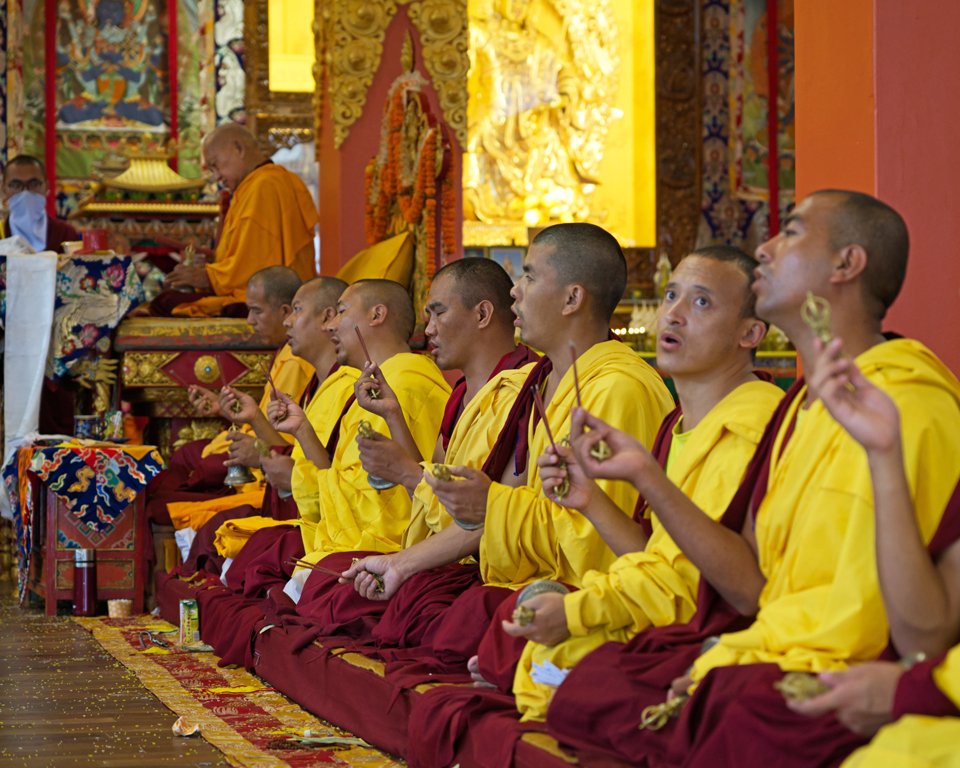
Lama Zopa Rinpoche attends annual consecration ceremony at Kopan Monastery, Nepal, July 2020. Photo by Ven. Lobsang Sherab.
Every year at Kopan Monastery a three-day consecration ceremony is performed by the Lama Gyupa monks. This year, Lama Zopa Rinpoche attended the afternoon session, in the recently rebuilt Chenrezig gompa, of the ceremony’s second day, which was also Chokhor Duchen. (For scenes from the ceremony, please see the video below.)
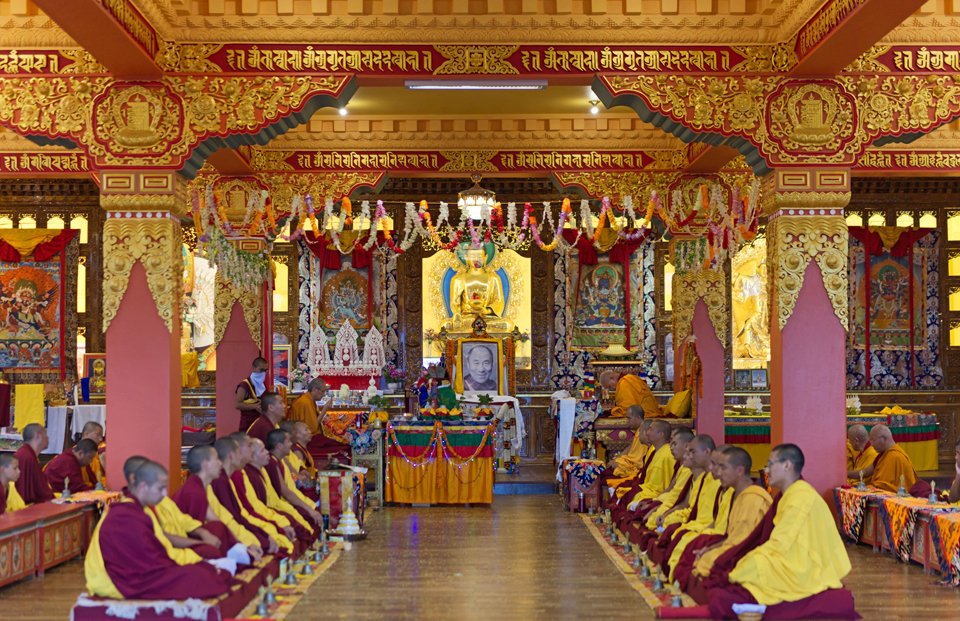
Lama Zopa Rinpoche and Khen Rinpoche Geshe Chonyi with Kopan Lama Gyupa monks during annual consecration ceremony, Kopan Monastery, July 2020. Photo by Ven. Lobsang Sherab.
The first day began with self-initiation in the morning and the consecration ceremony in the afternoon. On the second day, the practices done included Yamantaka Thirteen Deities sadhana, self-initiation, and increasing fire puja in the morning and the consecration ceremony in the afternoon. On the third day, the practices included Yamantaka Thirteen Deities sadhana, peaceful fire puja, and protector puja and tsog offering.
Please enjoy scenes from the annual consecration ceremony at Kopan Monastery:
https://youtu.be/EDRzJbc79I0
Watch more from the video series Lama Zopa Rinpoche’s Teachings on Thought Transformation during the Time of COVID-19 and find links to videos in translation, transcripts, MP3s, additional practice advice, and more:
https://fpmt.org/fpmt/announcements/resources-for-coronavirus-pandemic/advice-from-lama-zopa-rinpoche-for-coronavirus/
Practice advice from our teachers, Dharma study-from-home opportunities, and more can be found on the page “Resources for the Coronavirus Pandemic.”
Lama Zopa Rinpoche is the spiritual director of the Foundation for the Preservation of Mahayana Tradition (FPMT), a Tibetan Buddhist organization dedicated to the transmission of the Mahayana Buddhist tradition and values worldwide through teaching, meditation and community service.
- Tagged: kopan monastery, lama zopa rinpoche, puja, video
10
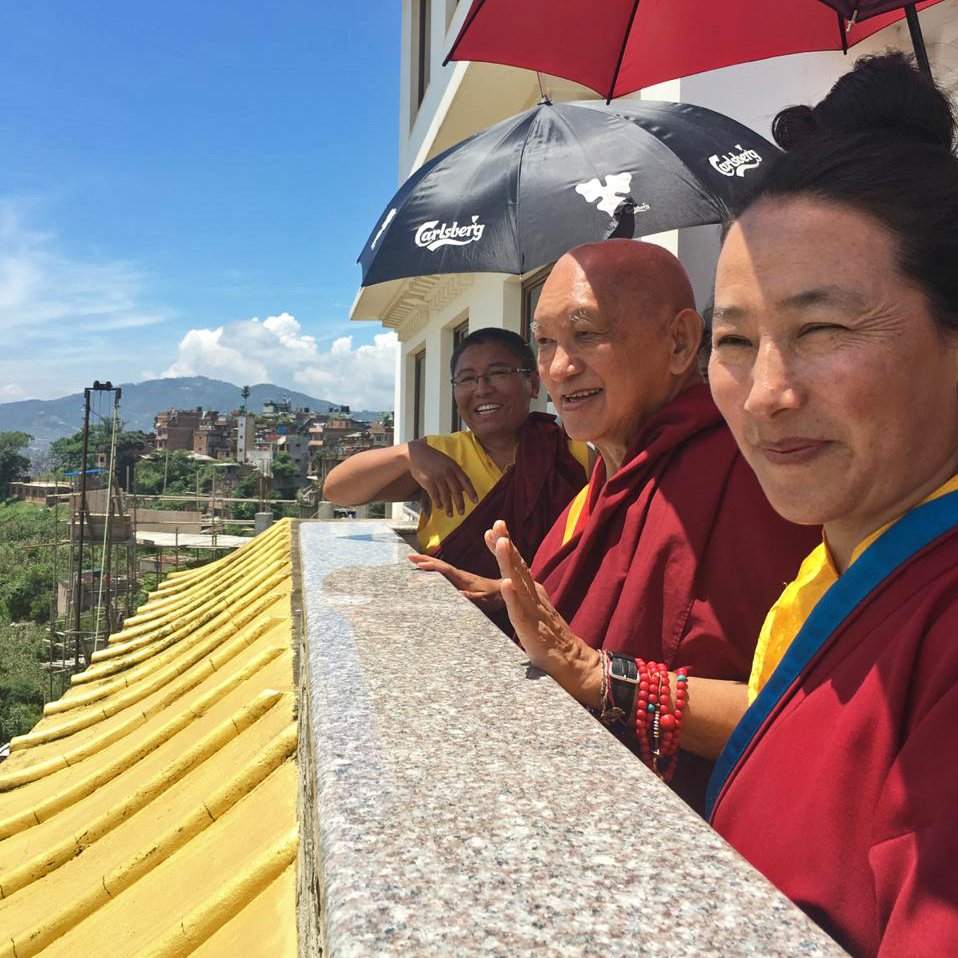
Tsoknyi Rinpoche, Lama Zopa Rinpoche, and Khadro-la enjoying a break during a day of fire and incenses pujas, Kathmandu, Nepal, August 2020. Photo by Ven. Lhundrup Topgye.
Lama Zopa Rinpoche continues his video teachings on thought transformation from Kopan Monastery in Nepal. Here is a summary of the most recent teaching:
Lama Zopa Rinpoche starts this teaching discussing the concept of equanimity. We think of ourselves as the most important and that our happiness is most important. However, every single being is as important as we are, and we can realize this by equalizing and exchanging ourselves with others. There is no proof or single logical reason that even a person who harms you is less important than you. Further, by harming others you are creating the cause to be harmed by them. You are so fortunate to be able to open your mind to understanding karma.
If you check, you will see that all suffering comes from cherishing “I” and all happiness comes from cherishing others. Those who harm you give you the opportunity to practice the perfection of patience, through which you can achieve enlightenment. So that person gives you enlightenment! Because you harmed others in the past, they are harming you now, which causes them to be reborn in the lower realms. If you think of karma, instead of wanting to harm that person, unbelievable compassion for that person arises, and you only want to help them.
Renouncing the “I” and cherishing others is what makes you enlightened. Since all of your happiness, including Buddha, Dharma, and Sangha, comes from sentient beings, how dare you harm them! If someone treats you badly, if your bodhichitta is very powerful, many eons of negative karma get purified.
When you fulfill the guru’s wishes and advice, it is the same as doing many preliminary practices. Even if the work is very hard with many problems and difficulties, and you are bearing many hardships, you should know this is something to enjoy the most, because it contains many hundreds of prostration, many thousands of Vajrasattva mantras, mandala offerings, and so forth within the work. It is most amazing. It becomes the happiest thing in your life.
If you experience suffering when you correctly follow the virtuous friend, it means that an inconceivable amount of negative karma is getting purified. If you are following the guru’s advice and get sick or experience problems, this is a very good thing because it is unbelievable purification—many many eons of suffering in the lower realms gets purified. How much purification happens depends on how well you practice. If you think you are fulfilling the guru’s wishes and advice, there are no problems, and you collect showers of good karma. Guru devotion is not some Tibetan lamas’ trip; it generates realizations of the path.
Referring to a text by Lama Tsongkhapa, Rinpoche emphasized that if the four dharmas (the four thoughts that turn the mind toward Dharma) are stabilized, the rest of the virtues will be instantly generated. The four dharmas are: 1. The perfect human rebirth, how it is highly meaningful; 2. The precious human rebirth is difficult to find again; 3. Impermanence-death; and 4. Karma. If you don’t have renunciation of this life, then renunciation of samsara, your practice won’t be a cause of liberation. It will be a cause of samsara.
We invite you to go deeper into the topics presented here, plus many others, by watching Rinpoche’s video and reading the full transcript of Rinpoche’s teaching.
Watch Lama Zopa Rinpoche’s teaching “Fulfilling the Guru’s Wishes and Advice Is the Most Enjoyable Thing in Life”:
https://youtu.be/S8YhdmUiBzQ
- Read the transcript of Rinpoche’s teaching
- Advice to Correctly Follow the Virtuous Friend with Thought and Action: The Nine Attitudes of Guru Devotion
- Dedication verses for COVID-19 Crisis Teachings
Watch more from the video series Lama Zopa Rinpoche’s Teachings on Thought Transformation during the Time of COVID-19 and find links to videos in translation, transcripts, MP3s, additional practice advice, and more:
https://fpmt.org/fpmt/announcements/resources-for-coronavirus-pandemic/advice-from-lama-zopa-rinpoche-for-coronavirus/
Practice advice from our teachers, Dharma study-from-home opportunities, and more can be found on the page “Resources for the Coronavirus Pandemic.”
Lama Zopa Rinpoche is the spiritual director of the Foundation for the Preservation of Mahayana Tradition (FPMT), a Tibetan Buddhist organization dedicated to the transmission of the Mahayana Buddhist tradition and values worldwide through teaching, meditation and community service.
- Tagged: advice from lama zopa rinpoche, coronavirus, covid-19, guru devotion, lama zopa rinpoche thought transformation video teaching, video
6
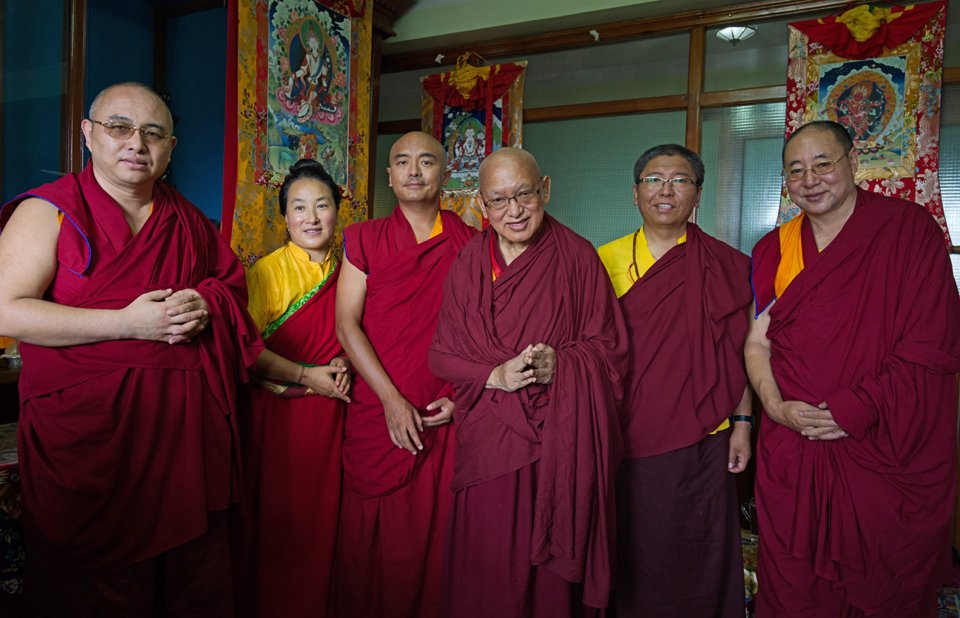
The core group of lama who have completed more than forty fire pujas for purification and healing. From left, Abbot of Mindroling Monastery, Khadro-la, Mingyur Rinpoche, Lama Zopa Rinpoche, Tsoknyi Rinpoche, abbot of Shechen Monastery, Nepal, July 2020. Photo by Ven. Lobsang Sherab.
Lama Zopa Rinpoche continues his video teachings on thought transformation from Kopan Monastery in Nepal. Here is a summary of the most recent teaching:
Lama Zopa Rinpoche begins this teaching explaining that lojong involves utilizing happiness and suffering on the path to enlightenment. In this way, everything one experiences is an opportunity for thought transformation.
This virus is teaching us about karma, but we don’t recognize this due to ignorance. We think suffering and happiness come from outside the mind, but if you understand karma, you know that it all comes from the mind. While you are a human being, this is the only chance to understand karma—not as a hell being, preta, or animal.
Even though we don’t like suffering, we run toward it and destroy happiness because sentient beings are totally ignorant of the cause of suffering and the cause of happiness. You are born as a human being this one time but then use the human capacity, mind, and intelligence in the wrong way to cause so much harm. We can use the present difficult situation in the world to develop compassion and to try to become better human beings, not harm the world and others, and at least bring happiness and peace to ourselves instead of becoming crazy. You are responsible to free the numberless sentient beings in the numberless universes, including the mosquito buzzing around in your ear!
You are still suffering in samsara because you didn’t change your mind into bodhichitta like Buddha did. Because you have Buddha nature, you have the potential to become an enlightened being. However, we live our lives running toward offering service to the self-cherishing thought, which is your worst enemy. Because of this we have been suffering from beginningless time up to now.
After meeting the Dharma you may study, do retreat, and learn many things, but sometimes nothing happens to your mind, and it may even become worse! When your mind is weak and you listen to the Dharma but can’t grasp words or understand the meaning, rely on the power of the holy merit field: Buddha, Dharma, Sangha in many different aspects. The main essence, the highest merit field is the guru. By depending on the special merit field, strive in the pure path to liberation and the state of omniscience.
If you don’t collect merit with outer and inner offerings, nothing will happen to your mind. The most important thing is to make offerings with a motivation possessed by bodhichitta, transformed in bodhichitta.
Don’t waste your human body, which has the eight freedoms and the ten richnesses. Make it meaningful. The essence is to create the cause for every single transmigratory being to achieve liberation and the state of omniscience, to achieve enlightenment for that. Happiness, the benefits, the realizations, the happiness within samsara, liberation, enlightenment—everything has to come from your mind.
We invite you to go deeper into the topics presented here, plus many others, by watching Rinpoche’s video and reading the full transcript of Rinpoche’s teaching.
Watch Lama Zopa Rinpoche’s teaching “If You Don’t Collect Merits Nothing Will Happen in Your Mind“:
https://youtu.be/j41TSWp8XfU
Watch more from the video series Lama Zopa Rinpoche’s Teachings on Thought Transformation during the Time of COVID-19 and find links to videos in translation, transcripts, MP3s, additional practice advice, and more:
https://fpmt.org/fpmt/announcements/resources-for-coronavirus-pandemic/advice-from-lama-zopa-rinpoche-for-coronavirus/
Practice advice from our teachers, Dharma study-from-home opportunities, and more can be found on the page “Resources for the Coronavirus Pandemic.”
Lama Zopa Rinpoche is the spiritual director of the Foundation for the Preservation of Mahayana Tradition (FPMT), a Tibetan Buddhist organization dedicated to the transmission of the Mahayana Buddhist tradition and values worldwide through teaching, meditation and community service.
- Tagged: advice from lama zopa rinpoche, coronavirus, covid-19, lama zopa rinpoche thought transformation video teaching, video
3
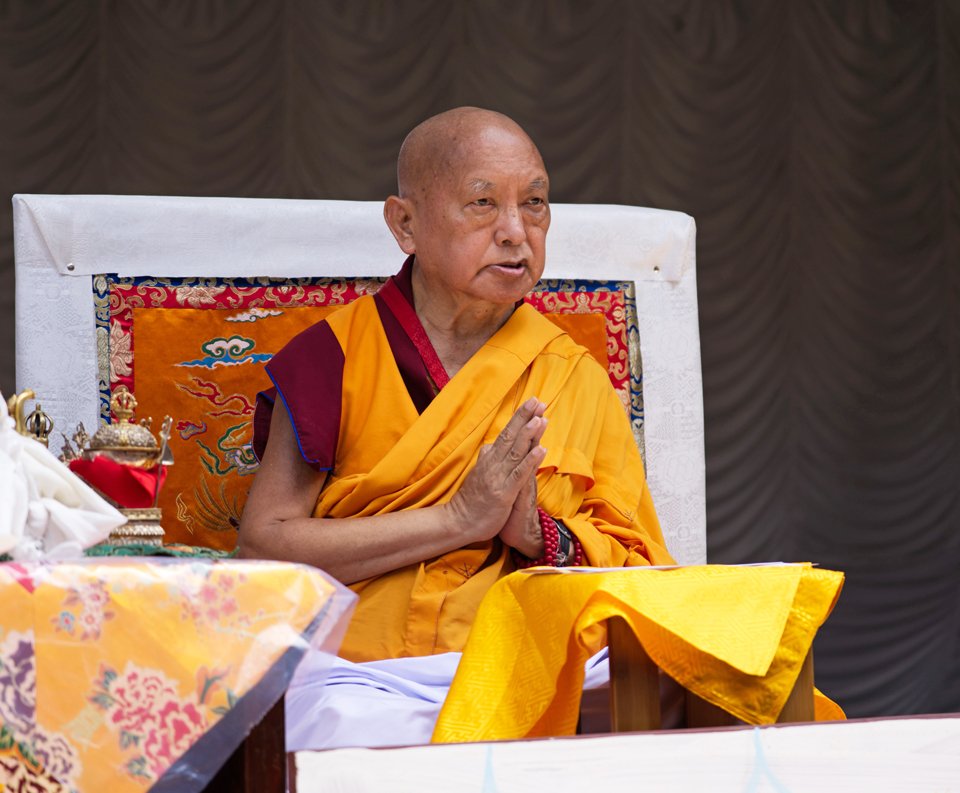
Lama Zopa Rinpoche during a fire puja, Kathmandu, Nepal, July 2020. Photo by Ven. Lobsang Sherab.
Lama Zopa Rinpoche made these comments in April 2014 after seeing images of the suffering of many people on television.
It’s important to use the situation to remind yourself how fortunate you are to still have a human body and a perfect human rebirth, which is most difficult to find, and that you have met the Buddhadharma and the virtuous friend.
Remind yourself how it’s most fortunate to still be a human being and not to waste it, and to practice the holy Dharma to purify and collect merit and actualize the path.
Use these kinds of situations to be inspired. The 270 people who died in the airplane accident, the sixteen Sherpas who died on Mount Everest, and so forth—use all these situations to remind yourself to practice Dharma and to generate compassion for those sentient beings and for all the suffering sentient beings.
This isn’t the first time [they have suffered and died like this]. They have experienced the suffering of pain, the suffering of change, and pervasive compounded suffering numberless times.
Then it’s helpful and becomes a meditation of the path of the lower, middle, and higher capable beings. Think of the suffering nature of samsara that has been experienced numberless times. This makes it useful when you hear that information and news.
This advice “Watching the News” was originally published in “Lama Zopa Rinpoche’s Online Advice Book” on the Lama Yeshe Wisdom Archive website:
https://www.lamayeshe.com/advice/watching-news
Watch the video series Lama Zopa Rinpoche’s Teachings on Thought Transformation during the Time of COVID-19 and find links to videos in translation, transcripts, MP3s, additional practice advice, and more:
https://fpmt.org/fpmt/announcements/resources-for-coronavirus-pandemic/advice-from-lama-zopa-rinpoche-for-coronavirus/
Lama Zopa Rinpoche is the spiritual director of the Foundation for the Preservation of Mahayana Tradition (FPMT), a Tibetan Buddhist organization dedicated to the transmission of the Mahayana Buddhist tradition and values worldwide through teaching, meditation and community service.
- Tagged: advice from lama zopa rinpoche
- Home
- News/Media
- Study & Practice
- About FPMT Education Services
- Latest News
- Programs
- New to Buddhism?
- Buddhist Mind Science: Activating Your Potential
- Heart Advice for Death and Dying
- Discovering Buddhism
- Living in the Path
- Exploring Buddhism
- FPMT Basic Program
- FPMT Masters Program
- FPMT In-Depth Meditation Training
- Maitripa College
- Lotsawa Rinchen Zangpo Translator Program
- Universal Education for Compassion & Wisdom
- Online Learning Center
- Prayers & Practice Materials
- Overview of Prayers & Practices
- Full Catalogue of Prayers & Practice Materials
- Explore Popular Topics
- Benefiting Animals
- Chenrezig Resources
- Death & Dying Resources
- Lama Chopa (Guru Puja)
- Lama Zopa Rinpoche: Compendium of Precious Instructions
- Lama Zopa Rinpoche: Life Practice Advice
- Lama Zopa Rinpoche Practice Series
- Lamrim Resources
- Mantras
- Prayer Book Updates
- Purification Practices
- Sutras
- Thought Transformation (Lojong)
- Audio Materials
- Dharma Dates – Tibetan Calendar
- Translation Services
- Publishing Services
- Teachings and Advice
- Find Teachings and Advice
- Lama Zopa Rinpoche Advice Page
- Lama Zopa Rinpoche: Compendium of Precious Instructions
- Lama Zopa Rinpoche Video Teachings
- ༧སྐྱབས་རྗེ་བཟོད་པ་རིན་པོ་ཆེ་མཆོག་ནས་སྩལ་བའི་བཀའ་སློབ་བརྙན་འཕྲིན།
- Podcasts
- Lama Yeshe Wisdom Archive
- Buddhism FAQ
- Dharma for Young People
- Resources on Holy Objects
- Ways to Offer Support
- Centers
- Affiliates Area
- Teachers
- Projects
- Charitable Projects
- Make a Donation
- Applying for Grants
- News about Projects
- Other Projects within FPMT
- Support International Office
- Projects Photo Galleries
- Give Where Most Needed
- FPMT
- Shop
Translate*
*powered by Google TranslateTranslation of pages on fpmt.org is performed by Google Translate, a third party service which FPMT has no control over. The service provides automated computer translations that are only an approximation of the websites' original content. The translations should not be considered exact and only used as a rough guide.No matter whether you are a believer or a non-believer, religious or not religious, a Christian, Hindu, or a scientist, black or white, an Easterner or a Westerner, the most important thing to know is your own mind and how it works.







